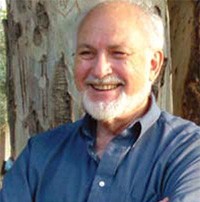
It would be hard to find a better fit for the word “pioneering” than the career of Armand Lauffer. In the fields of community organizing, continuing education, integrating new tools in teaching, and preparing students for careers in nonprofit management, his accomplishments have been ground-breaking and of international significance.
Lauffer attributes his choice of social work as a profession and his propensity to try to do things a bit differently to his family’s emigration from Belgium just prior to Nazi Germany’s invasion. The sense of being an outsider, when compounded by his awareness of the Holocaust, led to a strong identification with both his Jewish heritage and American liberalism, as well as with other outsiders in American society.
By the time Lauffer graduated from Roosevelt University in Chicago, he had logged in thousands of hours of paid and volunteer work in social agencies. His first full-time job was as a campus organizer for the American Zionist Council. After receiving his MSW from Wayne State University in Detroit, he worked in Jewish community centers in California, where he first started applying gaming as a tool for interactive learning.
While in the PhD program in social planning at Brandeis University in Massachusetts, he coauthored a casebook that included interviews with Caesar Chavez, Jesse Jackson, VISTA volunteers, and social planners. This was to be the first of more than twenty books, many of which pioneered such areas that had been only scantily addressed in the social work literature (e.g., nonprofit marketing, fundraising, and locality-based planning).
“All of us want to feel that what we do counts, that we can make a difference for others. For me, that sometimes requires doing things a bit differently, building from that part of me that relishes being outside the box,” Lauffer notes. The University of Michigan offered him what he was seeking—an academic position where he could keep his hand in practice, while also teaching, writing, and doing research.
In 1968 Dean Fedele Fauri invited him to join the faculty at the School of Social Work and start a continuing education program. Lauffer worked with state and national agencies on projects ranging from training the first directors of Area Agencies on Aging to promoting innovations in child care and adoption.
Lauffer published a book on game design in the 1970s and brought gaming into the mainstream of social work education through campuses throughout the United States and abroad. The School’s GRANTS ETC site [link no longer active], designed by students as a class assignment, is one of several class projects that contributed to Lauffer’s receiving a Computerworld Smithsonian designation as a technology laureate in education.
In 1980 Lauffer convened a national conference of macro faculty, which was the catalyst for the establishment of the Association for Community Organization and Social Administration (ACOSA), and the Journal of Social Work Practice. In 2000 he received ACOSA’s Lifetime Achievement Award. When he identified the need for short, well-targeted books for niche markets in social work, he created the SAGE Human Services Guide series that has produced more than 200 publications. He continues to serve as a coeditor with Professor Emeritus Charles Garvin.
Most fittingly, Lauffer’s retirement was celebrated, in 2000, at an event that also commemorated the tenth anniversary of the Sol Drachler Program in Jewish Communal Leadership (formerly Project STaR). Community leaders, SSW colleagues, and STaR alumni gathered to pay tribute to Lauffer, the program’s founder. He, in turn, described his pride in the alumni, many of whom are the current “stars” of Jewish federations, community centers, and family service agencies in both the United States and Israel.
Lauffer and his wife Rickie now live in Jerusalem, near their children, grandchildren, and greatgrandchildren. He dabbles in furniture making and photography and serves as a board member and consultant to a number of Israeli foundations and nonprofit organizations.
His colleague, Professor Michael Reisch, aptly sums up Lauffer’s pioneering career: “He is widely regarded in the field of community practice for his wisdom, his warmth, his humor, and his commitment to social work values. He is innovative without being trendy, steeped in tradition without being conservative, and able to integrate technological and conceptual changes into a consistently ethical practice framework.”
—Robin Adelson Little works at the U-M Exhibit Museum of Natural History. She is also a freelance writer and past editor of Ongoingworkshops on